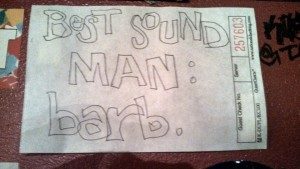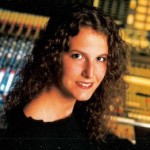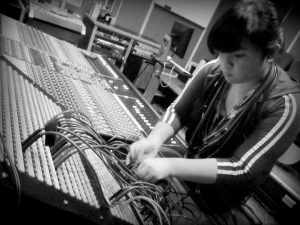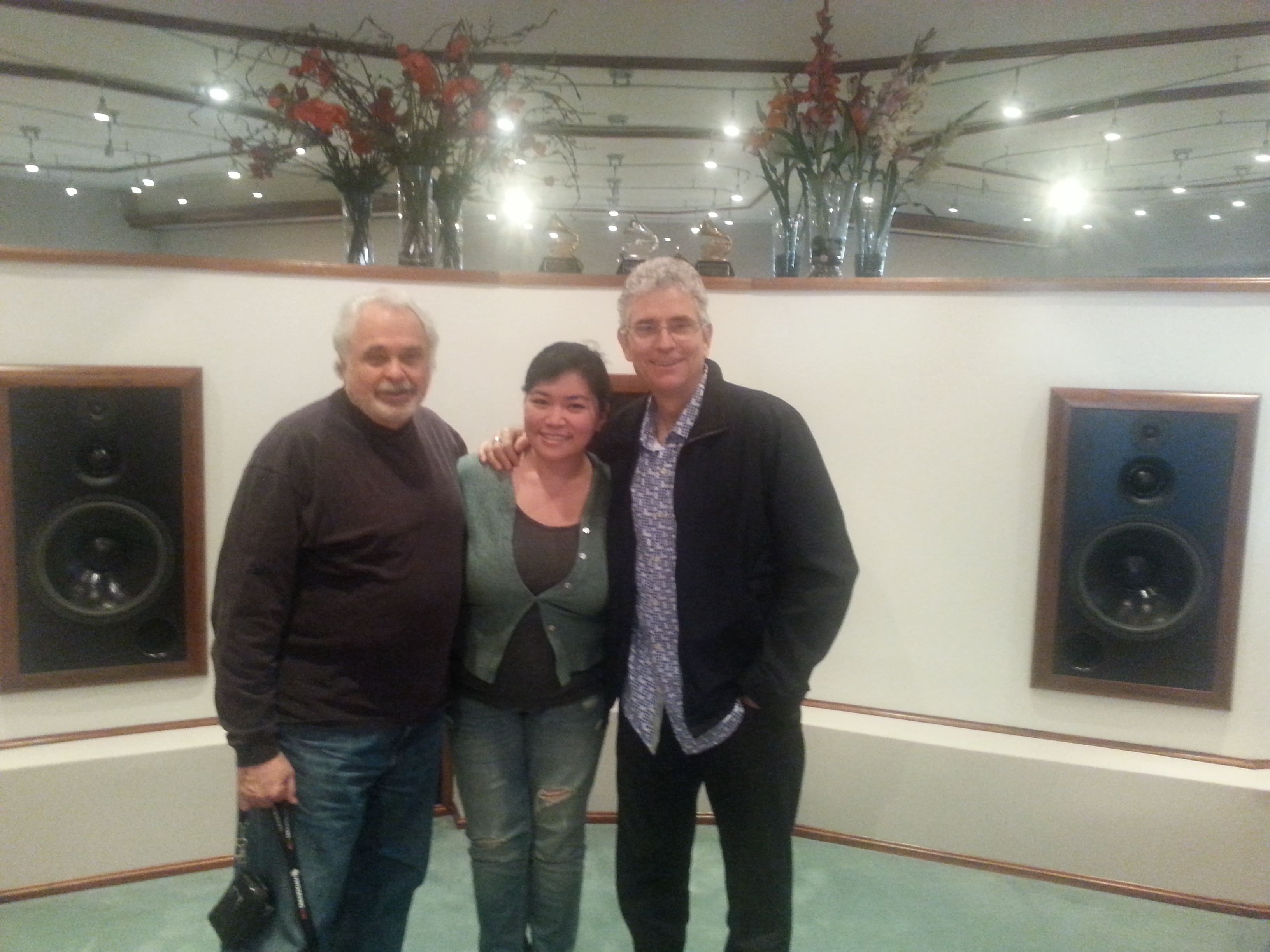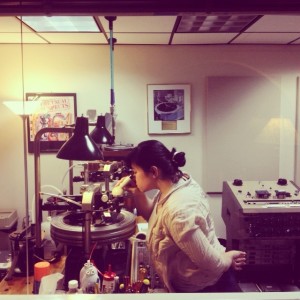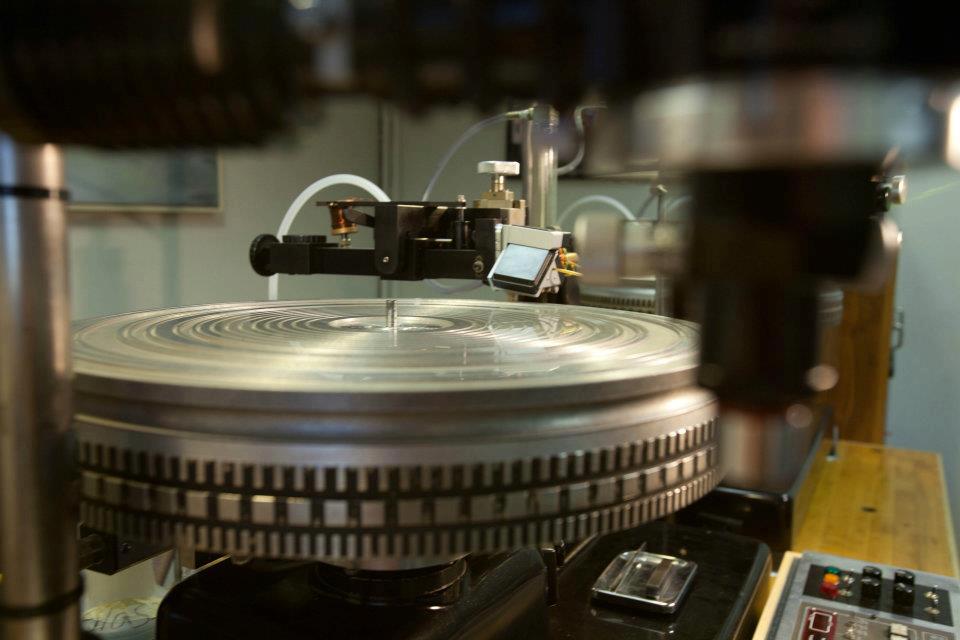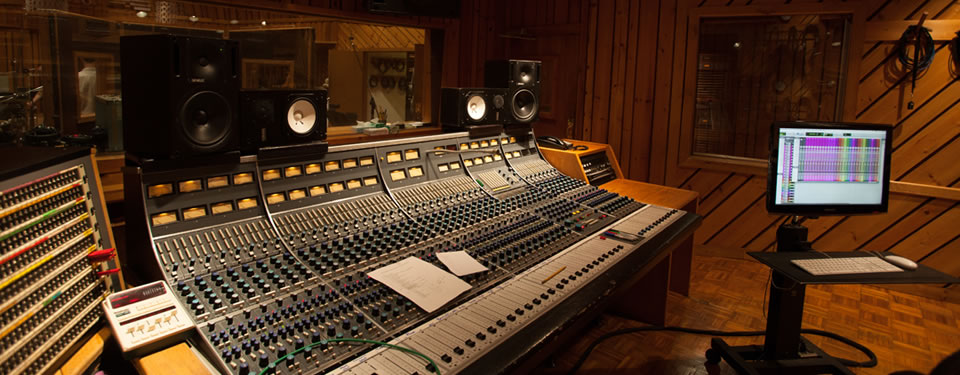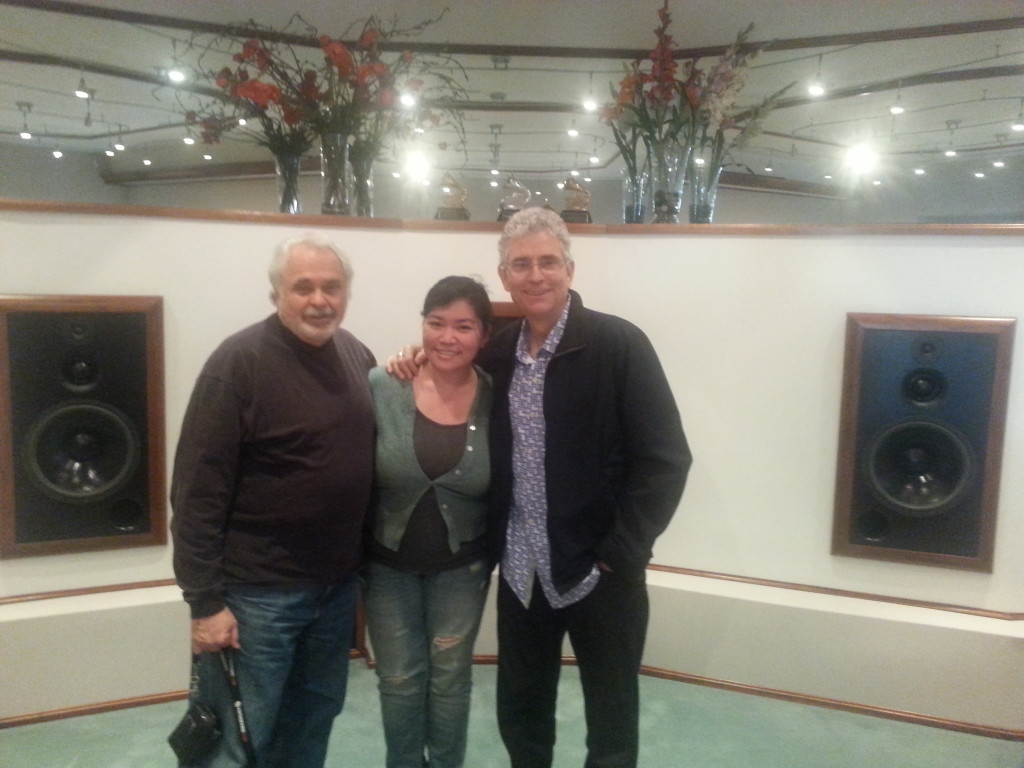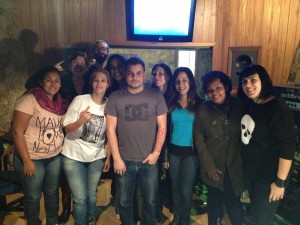
The Sound Girls of Brazil!
By: Karrie Keyes
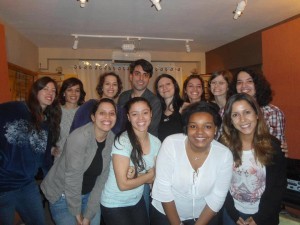 I recently had the chance to meet with some of the women of Mulheres do Audio while on tour in Brazil. Mulheres do Audio are a group of women audio engineers in Brazil, with membership around 126. They meet once a week to study, learn, and share their experiences. The women I met all have a passion for audio that drives them to succeed in not only a male dominated industry but country.
I recently had the chance to meet with some of the women of Mulheres do Audio while on tour in Brazil. Mulheres do Audio are a group of women audio engineers in Brazil, with membership around 126. They meet once a week to study, learn, and share their experiences. The women I met all have a passion for audio that drives them to succeed in not only a male dominated industry but country.
Mulheres do Audio – (Women’s Audio)
According to the United Nations Gender Inequality Index (GII), Brazil ranks at 62 amongst 187 countries. The United States comes in at number 23. Iceland has the narrowest gender gap, coming in at number one with Finland. Followed by Norway, Sweden, the Philippines, Ireland, New Zealand, Denmark, Switzerland, and Nicaragua. The report analyzes four key areas; health, access to education, economic participation, and political engagement. While North America comes in top for economic opportunity, education, and health, Asia and the Pacific lead the way in political empowerment.
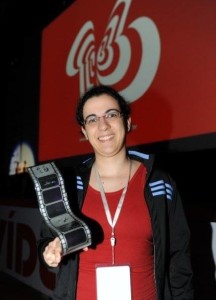 Ana Luiza Pereira a member of Mulheres do Audio shares with us some of the issues facing women in Brazil.
Ana Luiza Pereira a member of Mulheres do Audio shares with us some of the issues facing women in Brazil.
The majority of the population does not have access to good quality essential services such as education, health and transportation. For women, who traditionally have the role of taking care of the home and children, there are not good quality public childcare centers, so for those dealing with young children there’s no alternative other than housekeeping, occasionally doing day jobs like domestic work. Women that do work outside the home are not valued or respected.
The wage difference between men and women is up to 30% according to recent researches. Brazilian law condemns wage discrimination between men and women, yet contracts are made in a concealed way, considering different job positions for the same functions or anything else to justify a different wage.
There’s also the racial and ethnic discrimination. Although there is a lot of miscegenation, racism is a sad reality with black and poor women suffering more prejudice at work and school. Affirmative politics have been applied in public higher education schools in an effort to give more opportunities to the African descendants, but the population in general is still not conscious about the history and prejudice is very present even at the universities.
Unfortunately, sexist violence has been reaching extreme conditions at all social levels, but again, the poor suffer the most. Only recently we’ve been having campaigns against sexual harassment, but it’s an old practice which is rarely reported due to the embarrassment women suffer. There’s still a long way to go… Even though we have a woman president for the first time, the government has not been showing real results in politics for equality due to its commitment to bankers, international investors, corporations and all other capitalism agents to whom gender equality is not a primacy. Social movements have been making a great effort to denounce all those kinds of injuries. It is crucial to demand the government take immediate actions to acquire women’s rights and respect.
All of the women I met were willing to stand up for their rights and were vocal in demanding to be treated equally. Unfortunately, they face many of the same obstacles we face in the States and the rest of the world. Often silenced to keep a gig, not wanting to make waves, and just trying to prove yourself under heightened scrutiny because you are a woman. Many of the women were told over and over again that they could not be hired because they were not strong enough to load equipment and trucks.
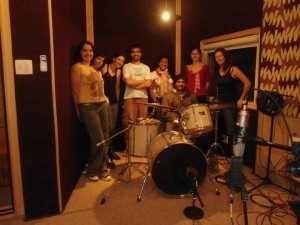 In Brazil it is even harder to stand out or shine with a certain expertise or field. There are very few men or women working in audio that can consider themselves a FOH engineer or Mastering Engineer. I was told by the women that they must be well versed in all aspects of audio. There simply is not enough work. One day they will be working in the studio, the next a live show, then working on a broadcast. In live sound they are expected to be able to do everything, often times being responsible for the set-up of equipment while mixing FOH and Monitors. Although, not unusual in the States, especially when starting out, you will hopefully be given to the opportunity to hone your skills to a specialty.
In Brazil it is even harder to stand out or shine with a certain expertise or field. There are very few men or women working in audio that can consider themselves a FOH engineer or Mastering Engineer. I was told by the women that they must be well versed in all aspects of audio. There simply is not enough work. One day they will be working in the studio, the next a live show, then working on a broadcast. In live sound they are expected to be able to do everything, often times being responsible for the set-up of equipment while mixing FOH and Monitors. Although, not unusual in the States, especially when starting out, you will hopefully be given to the opportunity to hone your skills to a specialty.
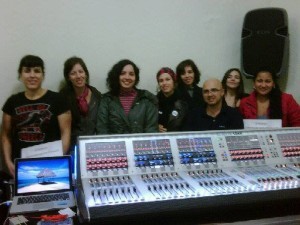 It is also important in Brazil to obtain a degree of some sort in show production, although programs at the Universities are limited. It is often the first question employers ask. Many of the women have pursued film school and working in film production. Others have pursued courses in recording and music production; one is a course in Tecnologia de Gravação e Produção Fonográfica (Recording Technology and Phonographic Production) at the Universidade Estácio de Sá, Rio de Janeiro; and Produção Musical (Music Production), at Universidade Anhembi Morumbi, São Paulo. There is also a graduate course offered in the Cinema and Audiovisual called Imagem e Som (Image and Sound) offered at Universidade Federal de Sao Carlos a free university.There are other private universities that offer graduation courses in Radio & TV and Audio Visiual. Most employers want completion of programs at IATEC in Rio de Janerio and IAV in Sao Paulo
It is also important in Brazil to obtain a degree of some sort in show production, although programs at the Universities are limited. It is often the first question employers ask. Many of the women have pursued film school and working in film production. Others have pursued courses in recording and music production; one is a course in Tecnologia de Gravação e Produção Fonográfica (Recording Technology and Phonographic Production) at the Universidade Estácio de Sá, Rio de Janeiro; and Produção Musical (Music Production), at Universidade Anhembi Morumbi, São Paulo. There is also a graduate course offered in the Cinema and Audiovisual called Imagem e Som (Image and Sound) offered at Universidade Federal de Sao Carlos a free university.There are other private universities that offer graduation courses in Radio & TV and Audio Visiual. Most employers want completion of programs at IATEC in Rio de Janerio and IAV in Sao Paulo
Ana Luiza works primarily on film sound post production, and as a sound editor and designer. She currently teaches at Universidade Federal de Sao Carlos as a sound design professor. Ana Luiza decided to teach to provide women with a role model and contribute her expertise so that students would have a specialized learning experience.
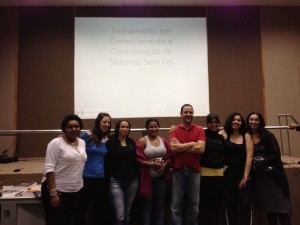 All of the women take advantage of learning on their own, pursuing online tutorials and courses. They have maintain two facebook pages Female Pro Audio, which is a closed group and was created after AES in 2012 and Mulheres do Audio, which highlights how many women work in the field of sound in Brazil and around the world. Female Pro Audio was created to answer the questions all of us Sound Girls hear over and over again- ‘Wow, a woman in audio, you are the first one I have met. Are there other women? How many women? What got you interested in audio?’ Then they invited all the women they knew to join.
All of the women take advantage of learning on their own, pursuing online tutorials and courses. They have maintain two facebook pages Female Pro Audio, which is a closed group and was created after AES in 2012 and Mulheres do Audio, which highlights how many women work in the field of sound in Brazil and around the world. Female Pro Audio was created to answer the questions all of us Sound Girls hear over and over again- ‘Wow, a woman in audio, you are the first one I have met. Are there other women? How many women? What got you interested in audio?’ Then they invited all the women they knew to join.
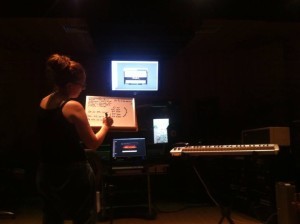 Eventually Female Pro Audio started to organize weekly meetings in Sao Paulo, and I was fortunate enough to be able to attend one of their meetings. They developed a study plan, outlined subjects to talk and learn more about, and found a recording studio to meet at. The meetings are held at FlapC4 and the women have been meeting since the fall of 2012 to share their experiences, impressions, and what actions they can take to reduce the sexism they face in professional audio. They are able to network and find jobs, it is also a safe place for them to blow of steam. Mulheres do Audio on Facebook is the SoundGirls.Org of Brazil. It puts a face to the women working in professional audio throughout the world and a place where they can meet each other.
Eventually Female Pro Audio started to organize weekly meetings in Sao Paulo, and I was fortunate enough to be able to attend one of their meetings. They developed a study plan, outlined subjects to talk and learn more about, and found a recording studio to meet at. The meetings are held at FlapC4 and the women have been meeting since the fall of 2012 to share their experiences, impressions, and what actions they can take to reduce the sexism they face in professional audio. They are able to network and find jobs, it is also a safe place for them to blow of steam. Mulheres do Audio on Facebook is the SoundGirls.Org of Brazil. It puts a face to the women working in professional audio throughout the world and a place where they can meet each other.
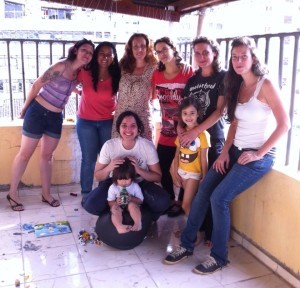 The Women’s Audio Mission and SoundGirls.Org have been sources on inspiration. Mulheres do Audio has also been a source of inspiration to SoundGirls.Org. It was truly a wonderful experience sharing the afternoon with these women and glimpsing a part of their lives. Several of the women came to see the monitor world on the Eddie Vedder solo tour and were able to watch the crew line check, again we shared tips and stories it was truly inspiring experience I will not soon forget.
The Women’s Audio Mission and SoundGirls.Org have been sources on inspiration. Mulheres do Audio has also been a source of inspiration to SoundGirls.Org. It was truly a wonderful experience sharing the afternoon with these women and glimpsing a part of their lives. Several of the women came to see the monitor world on the Eddie Vedder solo tour and were able to watch the crew line check, again we shared tips and stories it was truly inspiring experience I will not soon forget.
SoundGirls.Org will be highlighting their stories and experiences in the future and I encourage anyone traveling to Brazil to get in touch with them.





